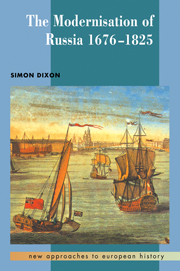2 - Imperial great power
Published online by Cambridge University Press: 05 June 2012
Summary
Ambitions and achievements
Montesquieu declared that ‘toward the middle of the reign of Louis XIV’, when France was at the height of its international powers, ‘Muscovy was as yet no better known in Europe than was the Crimea.’ It was certainly little better respected. Though the temptations of international trade lured a succession of peripatetic European diplomatic missions to Moscow during the seventeenth century, Muscovy's place in the international system was scarcely more secure in the 1670s than it had been in the 1570s. If anything, it had become more precarious as medieval ‘Christendom’ fragmented under the impact of the Reformation into ‘Europe’, a secular amalgam of sovereign states. Nor was the question easily resolved: a striking recent survey takes the disputed place of Russia as ‘the cardinal problem’ in Europe's 500-year history.
There was no more convinced enemy of the Ottoman empire than Muscovy, whose Orthodox rulers always reserved a particular distaste for Islam. It was, indeed, an unfulfilled aim of Peter the Great's Grand Embassy in 1697–8 to bolster the Christian alliance formed against Constantinople in 1686. Yet, to Western writers in search of ‘perpetual peace’, Muscovites seemed closer to the infidel Turk than to ‘civilised’ European nations who defined themselves in opposition to a barbarian Oriental ‘other’. In 1647, John Milton acknowledged Muscovy as ‘the most northerly Region of Europe reputed civil’.
- Type
- Chapter
- Information
- The Modernisation of Russia, 1676–1825 , pp. 27 - 56Publisher: Cambridge University PressPrint publication year: 1999

